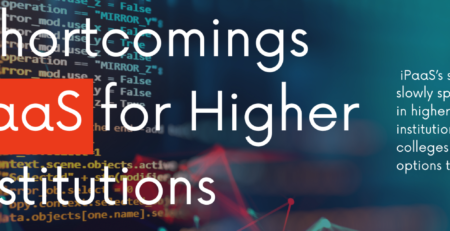Can Institutions Benefit from a Complex Software Ecosystem?
The use of technology in higher ed institutions has become quite mainstream in the last two decades. However, with an array of data flowing in from different departmental software applications, colleges require tremendous technical expertise to manage it. Moreover, a complex software ecosystem merely collects and stores massive amounts of data. Now, colleges are looking for simplified solutions that can help them effectively use this data to improve operational efficiency and optimize different processes.
In this post, we’ll share the disadvantages of a complex software ecosystem in higher ed institutions. Read on to learn them!
The Disadvantages of a Complex Software Ecosystem
If you use an iPaaS tool at your institute, you must have noticed many lackings and inefficiencies, such as data duplication, messy APIs, lagging, and unsupported features. Generally, the more complex a system is, the more inefficient it potentially is. Here’s why:
1. More Hardware, More Cost
Software is not self-supporting. You need hardware that is carefully engineered and linked with other hardware, just like a biological ecosystem to run it. The larger the software ecosystem, the more hardware you generally require. The more hardware you require, the more fixed and recurring costs you have to bear.
2. Inaccessible Data
Suppose your marketing department’s software crashes, and the enrollment department can’t access student data to call them. That’s a recurring problem with complex software ecosystems. While functioning independently can serve as an advantage, it often leads to a lack of accessibility. Hence, colleges are opting for an integration platform like ASMA Connect that centralizes data and makes it available across every department.
3. Inconsistent Data
How often have you experienced two departments having different sets of data, such as student name, address, and contact number? Higher ed institutions cannot fully benefit from a complex software ecosystem if the data is inconsistent across different departments. Moreover, information about the same student through different departments can lead to duplication and redundancy.
4. Service and Support
With multiple software and hardware to manage, maintenance can become a major issue. Managing a complex software ecosystem can be overwhelming and will require not only more manpower but also more experienced administrators. This challenge exists because not all management systems are created equal. These systems don’t often achieve the demanded flexibility and dependability you need a dedicated IT department with great adaptability and technical knowledge to ensure smooth running.
Bottom Line
Can institutions benefit from a complex software ecosystem? Yes, they can. But do they have to? No, they don’t. Not when you have an integration platform like ASMA Connect that takes the complexity out of the equation. With one platform to rule them all, you can optimize every aspect of your data collection and utilization.










Leave a Reply